Key takeaways:
- Puzzle adventures enhance cognitive skills, emotional resilience, and collaboration, making them valuable for personal growth.
- Understanding cryptocurrency involves connecting concepts to familiar experiences, which can make learning more accessible.
- The skills gained from solving puzzles, such as persistence and creativity, are directly applicable to navigating challenges in the crypto space.
- Collaboration in both puzzle-solving and crypto fosters unique insights and strategies, emphasizing the value of community engagement.
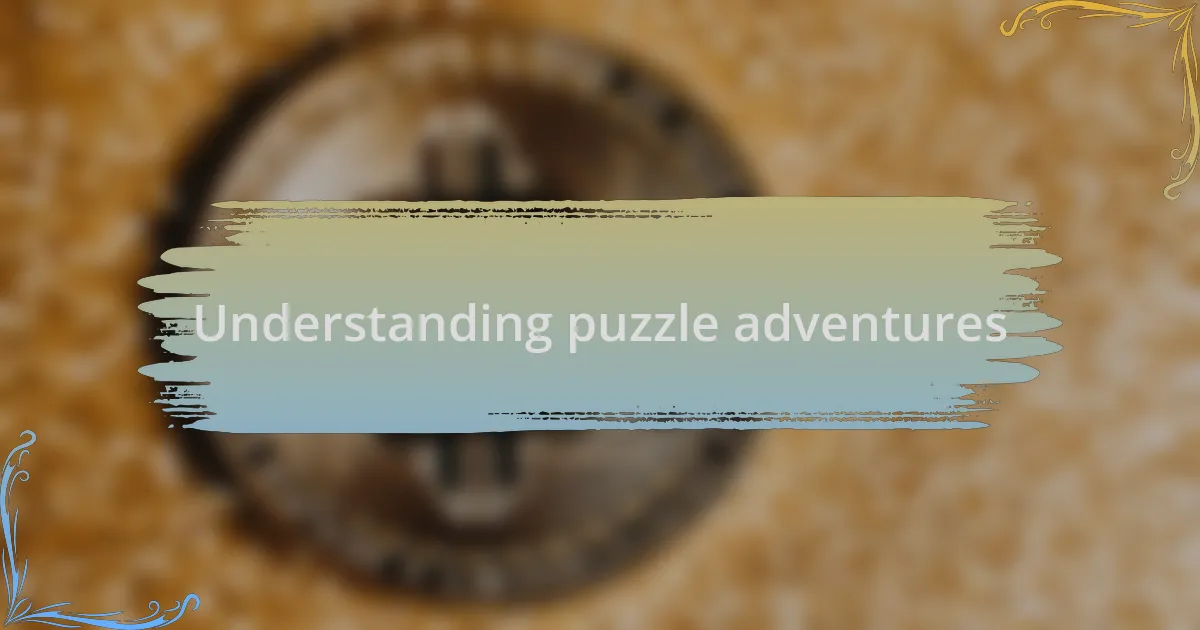
Understanding puzzle adventures
Puzzle adventures are intriguing challenges that blend problem-solving with storytelling, creating an immersive experience that captivates both young and old. I remember the first time I solved a complex puzzle in a game, the thrill of discovery filled me with excitement. It’s not just about reaching a solution; it’s about the journey—the twists and turns that keep you guessing.
These adventures often encourage critical thinking and creativity, as you must navigate through puzzles that require more than just logic—they demand imagination. Have you ever found yourself staring blankly at a puzzle, only to suddenly unlock a solution while in the shower? That’s the beauty of puzzle adventures; they stimulate your mind in unexpected ways. Each challenge can feel overwhelming at first, yet the satisfaction that follows is incredibly rewarding, making every effort worthwhile.
Moreover, they offer a sense of achievement that few other activities can match. I recall completing a particularly difficult escape room with friends, where teamwork was essential. The laughter and camaraderie we shared during that experience are memories I cherish. It’s almost magical how working together to solve a puzzle can strengthen bonds and create unforgettable moments.
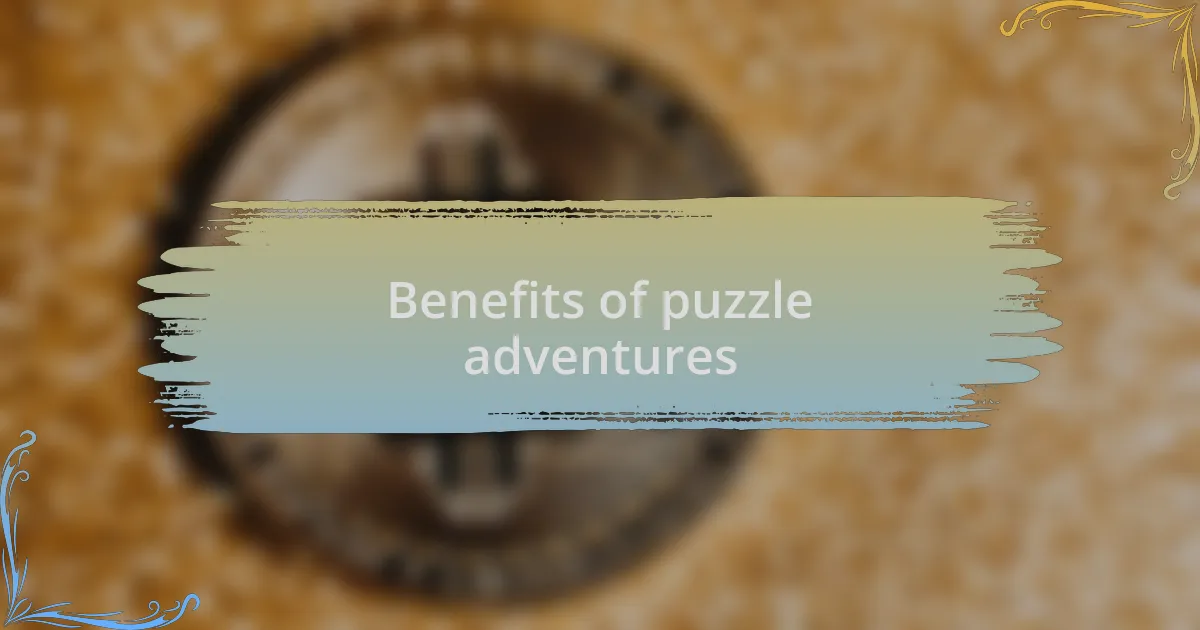
Benefits of puzzle adventures
Engaging in puzzle adventures boosts cognitive skills, making them a powerful tool for young minds. I’ve often found that after a session of puzzling, my mental agility feels sharper. When kids immerse themselves in solving varied challenges, they exercise their brains, much like muscles that grow stronger with use. Have you ever noticed how a good puzzle ignites a spark of focus? It’s fascinating how these activities sharpen attention and persistence.
Another undeniable benefit of puzzle adventures is their ability to enhance emotional resilience. I vividly remember feeling frustrated while attempting to piece together a particularly tricky puzzle. Yet, overcoming that frustration was incredibly gratifying. Moments of struggle followed by breakthrough moments teach kids the valuable lesson that perseverance pays off. Isn’t it empowering to know that every challenge faced shapes our ability to bounce back stronger?
Moreover, puzzle adventures often foster collaboration and communication skills. I recently participated in a treasure hunt with family, which required us to share ideas and strategies to progress. It struck me how seamlessly we worked together, pivoting when one idea didn’t pan out, allowing for laughter as we navigated our way to the next clue. Have you experienced something similar? It’s remarkable how these shared experiences can teach invaluable social skills while having fun at the same time!
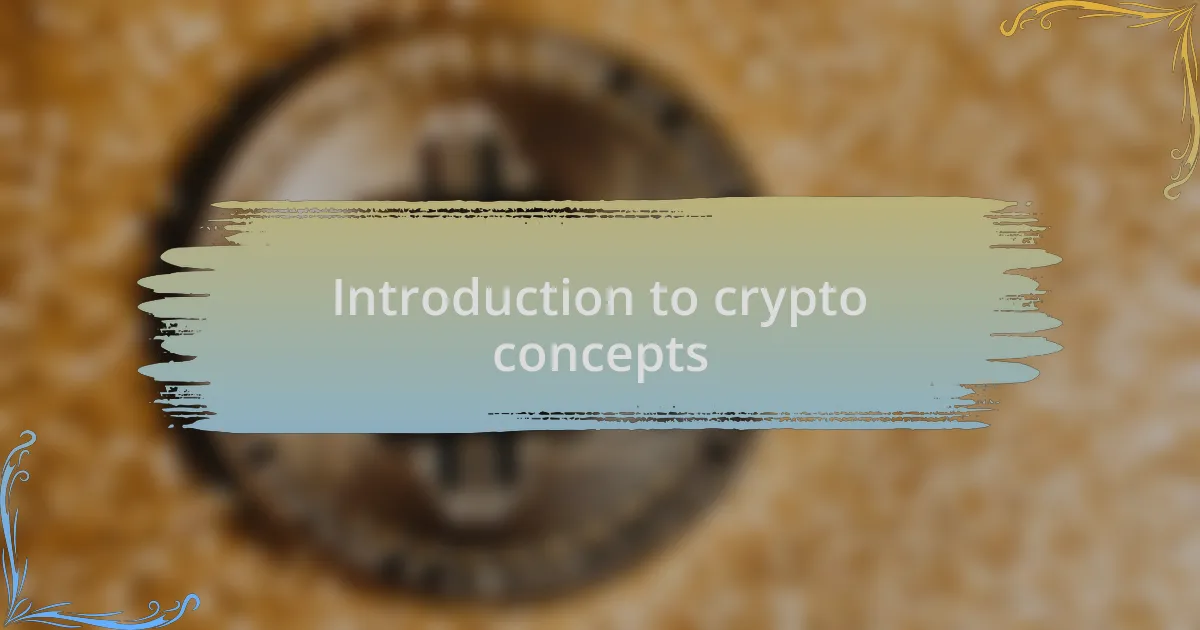
Introduction to crypto concepts
Crypto concepts may seem daunting at first, but they’re actually quite approachable. I remember my initial interaction with cryptocurrency; it felt like discovering a hidden treasure map, full of promise and excitement. Just as puzzles have distinct pieces that fit together, understanding crypto involves piecing together various components, such as blockchain technology, digital wallets, and what cryptocurrencies actually are.
When introducing these concepts to kids, I find it helpful to connect them to their everyday experiences. For instance, explaining how a digital wallet works can parallel the way they manage their allowance. Have you ever noticed how kids keep track of their money? They often assign value to their purchases, just as cryptocurrencies represent a digital value that can be exchanged or stored. Relating these ideas to something familiar can help demystify them.
Another crucial aspect of crypto is the idea of security. I recall the first time I learned about private keys; it felt like the ultimate secret you needed to protect your castle. In essence, a private key is like a password, giving you access to your digital assets. Why is understanding this important? Because it empowers children to be cautious and smart about their online activities, much like how they wouldn’t share their home address with strangers.
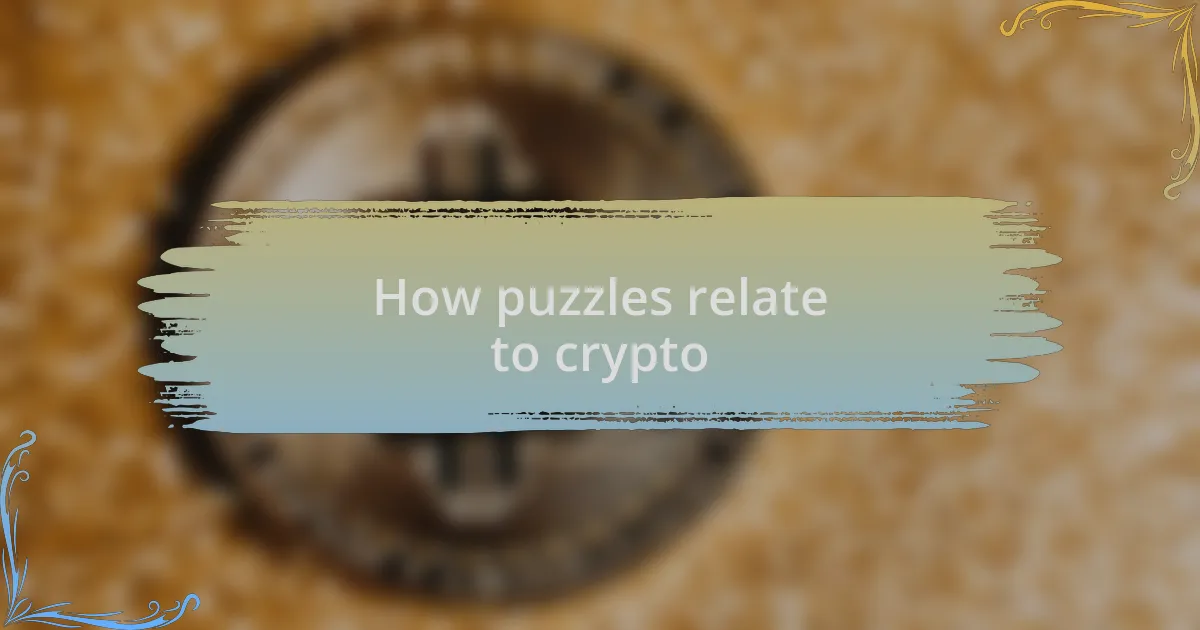
How puzzles relate to crypto
Puzzles and cryptocurrencies are surprisingly similar in their reliance on problem-solving and critical thinking. When I first encountered blockchain, it felt like piecing together a complex jigsaw puzzle, where every block fits precisely into the next. Each new concept I learned unlocked a piece of the larger picture, much like how solving a puzzle reveals a beautiful image over time.
Moreover, I often think about the challenges that arise in both realms. For instance, when you encounter a tricky puzzle, it’s about persevering and discovering the hidden logic behind it. This mirrors the path of crypto; navigating market trends and learning from failures really tests one’s reasoning abilities. So, have you ever felt stuck at a puzzle, only to find that the solution was right in front of you all along? That feeling of realization is exactly how I perceive the learning curve in cryptocurrency.
Finally, there’s an element of creativity that ties puzzles to crypto as well. Each transaction or investment can feel like a move in a strategic game, where you need to anticipate outcomes and think several steps ahead. I remember the excitement of making my first small crypto investment; it was exhilarating to think outside the box, strategizing like I would when tackling a challenging puzzle. Isn’t it fascinating how both activities invite exploration of new ideas and confidence in our decisions?
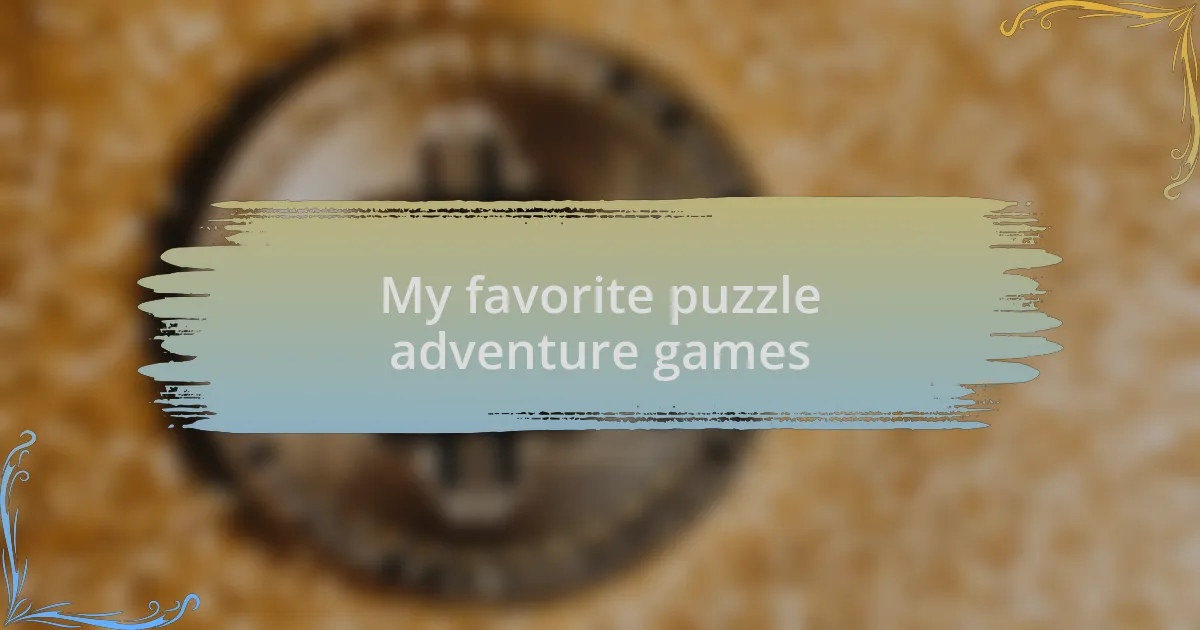
My favorite puzzle adventure games
There’s something utterly absorbing about puzzle adventure games that keeps me coming back for more. One title that stands out is “The Legend of Zelda: The Wind Waker.” I remember the thrill of sailing across vast oceans, solving intricate puzzles to unlock hidden treasures. Each puzzle felt like I was deciphering a new layer of mystery, and the sense of achievement I got from completing them was immensely rewarding.
Another favorite of mine is “Fez.” It transformed my perception of 2D puzzles by introducing 3D elements in a charmingly pixelated world. I found joy in rotating the world to unveil secret paths and hidden objects. It brought out my inner explorer, as I eagerly anticipated what new challenge awaited around the corner. Isn’t it captivating how a simple change in perspective can reveal endless possibilities?
Lastly, the game “Portal” has a special place in my heart. The way I had to think critically and use my environment to solve mind-bending challenges was exhilarating. I still chuckle when I think about the clever humor woven into the game, making each triumph even sweeter. How often do you find a game that pushes your limits while keeping you entertained? It’s experiences like these that make puzzle adventures unforgettable for me.
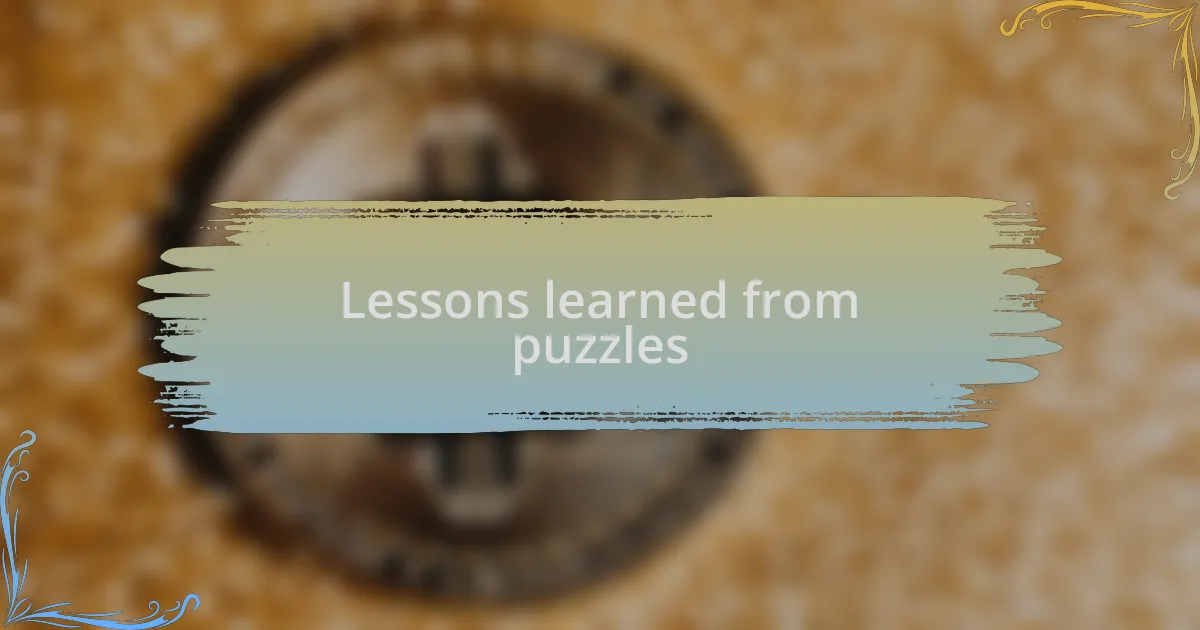
Lessons learned from puzzles
Solving puzzles often teaches persistence. I recall spending hours stuck on a particularly challenging riddle in one game, feeling frustration build up as I tried to piece together the clues. However, when I finally connected the dots and unlocked the next segment of the story, that euphoria made the struggle worth it. Isn’t it interesting how moments of difficulty can turn into memorable triumphs?
Another important lesson is the value of creativity. In many puzzle adventures, thinking outside the box is crucial. I remember one instance where I had to combine objects in an unexpected way to progress. The unconventional method sparked a realization: sometimes, the solution isn’t about following rules but breaking them. This creative thinking has influenced how I approach challenges in everyday life, encouraging me to explore unconventional solutions.
Collaboration is another key takeaway. One time, while playing a multiplayer puzzle game with friends, we had to combine our ideas to solve a series of interconnected puzzles. It not only strengthened our bonds but also highlighted how teamwork can yield unique perspectives and solutions. Have you ever noticed how sharing insights can lead to breakthroughs you might not have achieved alone? These collaborative experiences underscore the importance of community in tackling challenges, both in games and in real life.

Applying puzzle solutions to crypto
When I think about applying puzzle solutions to crypto, one lesson stands out: the importance of dissecting a problem into manageable parts. In a recent crypto trading simulation, I encountered a particularly volatile market behavior that baffled me. Instead of trying to tackle it all at once, I broke it down into market trends, historical data, and trader sentiment. It reminded me of the way that piecing together a complex puzzle can lead to clearer insights. How could this approach change the way you understand market fluctuations, I wonder?
Creativity also plays a vital role in navigating the crypto landscape. I recall when I was working on analyzing a new cryptocurrency project; the data was overwhelming. Instead of sticking to traditional metrics, I explored innovative indicators like community engagement and project transparency. This shift in perspective—looking beyond the usual—aided my understanding in a way I hadn’t expected. Have you ever had an ‘aha’ moment when you tried a different angle to solve a problem?
Moreover, collaboration in the crypto space echoes my experiences in puzzle-solving. I once joined a forum where fellow enthusiasts shared their insights on decentralized finance projects. Much like collaborating with friends on a puzzle, exchanging ideas with others opened my eyes to new strategies and solutions I hadn’t considered. Isn’t it fascinating how engaging with a community can elevate your understanding and ideation process? Together, we can unravel complex concepts that might seem insurmountable alone.